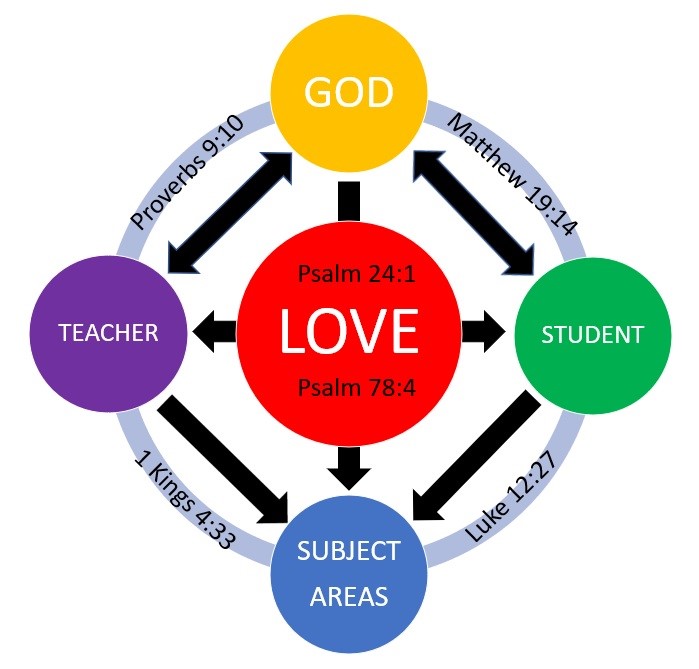
Education involves six key relationships or contexts that Protestant schools allow to flourish: the connection between God, teachers, students, and subject areas (the world as curriculum). Some of these are easy to see… the relationship between teachers and students is very important for behavior management. Other relationships seem to be missing, such as students getting along with each other.
What I suggest is that a Christian School (rooted in the Protestant tradition of thought and learning) is able to recognize these connections as valuable for the educational experience and community.
God, who is Father, Son, and Holy Spirit, has created people both as educators and learners, and the world in which they all live. This leads to 6 Loves.
- God loves the Subject Areas. Psalm 24:1 tells us, “The earth is the Lord’s and everything in it.” He loves what He has made (Psalm 145:13) and He created all things with their own value and knowledge. Genesis 1:31 “And God saw all that He had made, and it was very good.” This is often overlooked, but God’s creativity, order, and wisdom is always discovered in the things he creates, from the atom to the solar system.
- God loves the Teacher, and the teacher loves God. Proverbs 9:10 reminds us that the fear (awe) of God is the beginning of wisdom. The Bible is full of great promises for teachers like us. “Come to me, all who are weary,” said Jesus (Matthew 11:28). He is not only our Father in Heaven but also a Teacher. He sympathizes with us. We are able to endure the work because Jesus Christ reveals God’s love (1 John 4:10).
- God loves the Student. We tell the children and youth this all the time, and it is true. Matthew 19:14 commands us to let the children come to God in prayer, in discussions, in our chapels and assemblies, in our lessons. We want our students to love God as well, to repent of their sins, and to live by faith. This gift of grace is a key legacy of the Reformation.
- The fourth connection is the love between Teacher and Student. The Holy Spirit creates a relationship of trust, respect, affection, and memory between them. This is initiated by the teacher, and over time is reciprocated by the student. Some children are difficult to love. This is why we need the love of God first in our hearts, so that we may love the young people, especially if they don’t seem to care. But it is true that a teacher who tries to respect and love one’s students will always find some appreciation. Psalm 78:4 tells us that we love our students when we share the truth of the Bible with them.
- The fifth connection is the love of the Teacher for the Subject Areas, for teaching itself. It is our craft. The carpenter loves working with his tools, the farmer loves her craft, and so does the teacher. God wants us to love wisdom most of all: the wisdom that leads to insight, like that of Solomon (1 Kings 4:33) who delighted in sharing his knowledge of plants and animals. If we are enthusiastic about our subject areas, our students may be excited as well.
- Finally, the Student begins to love the Subject Area. This connection is so important because it is the purpose of every education to produce Learners keep learning. They will do this if they have a sense of the greatness, majesty, and sorrow of this world. Whether learning Maths, Languages, Literature, History, Science, Art, or Music, we desire to see in each child a fascination that inspires imagination and innovation. The skills support a mindset of life-long learning. Luke 12:27 declares, “Consider how the wildflowers grow…”
When I attended the 2017 Conference, we stayed at Karl Marx Schule in Wittenberg. I walked along the abandoned sport track outside, and gathered blue wildflowers to press flat and take back to America. These flowers reminded me that even though the world fades, God’s Word is permanent (Isaiah 40:8). We can trust God and put our hope in Him during these challenging times, and keep praying for the 6 Connections to flourish and thrive in our Global Pedagogical Network of schools.
Brian Huseland
Spokane, Washington state (province), USA

